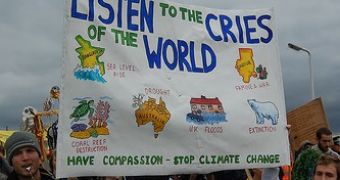The fourth edition of the Euroscience Open Forum took place at the former FIAT headquarters known as Lingotto Congressi, in Torino, July 2-7. The first day was marked by the speech of Walter Staveloz, director of International Relations for the Association of Science Technology Centers in Washington, DC and former director of the European network of science centers and museums. His message - “100 science cafes don’t make new climate change policy.” - had a big impact on the audience, even if it the majority would have rather not hear it.
The session's topic was “Informing and Engaging Citizens on Climate Change Issues” and the seats were filled with journalists, scientists and PR officers. They were all eager to learn how to encourage people in believing that man-caused climate change can be controlled.
Staveloz said that “there is public fatigue with climate change, and we have to ask ourselves why.” The economic crisis gets blamed by the majority, because people think mostly of the present and less of the future. It also appears that in Europe, people don't like being criticized about their ecological behavior. This phenomenon has a reasonable explanation; Europeans already pay high taxes on gasoline and mostly everything else, use trains and other forms of public transportation regularly, live in much smaller homes and consume less than Americans in general. As a result, their carbon emissions are actually down slightly from what they were in the 90's.
Europeans and Americans have different perspectives on climate change behavior and solutions. Staveloz reminded the results of an on-line climate game played by 300 players around the Globe, during the Copenhagen Conference last October. Europeans who played the game favored international agreements to prompt climate change as Americans favored economic bonuses.
Both points of view will be necessary in the future, but until then, Staveloz stressed that “people hate catastrophe messages” and they are more likely not to listen if they feel powerless. They need to have their own plan and take examples from others around them.

 14 DAY TRIAL //
14 DAY TRIAL //